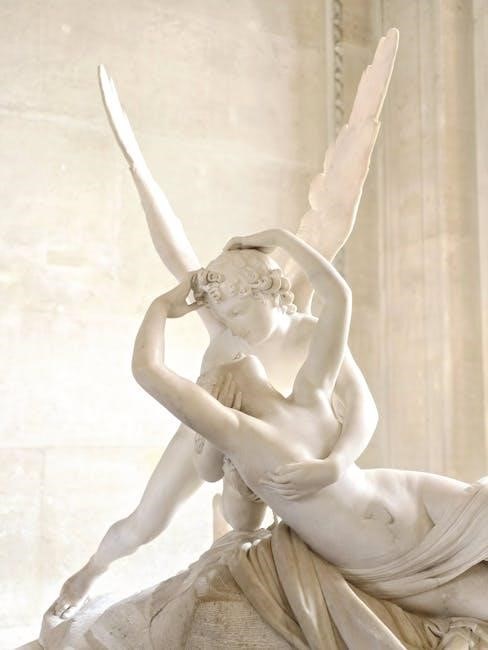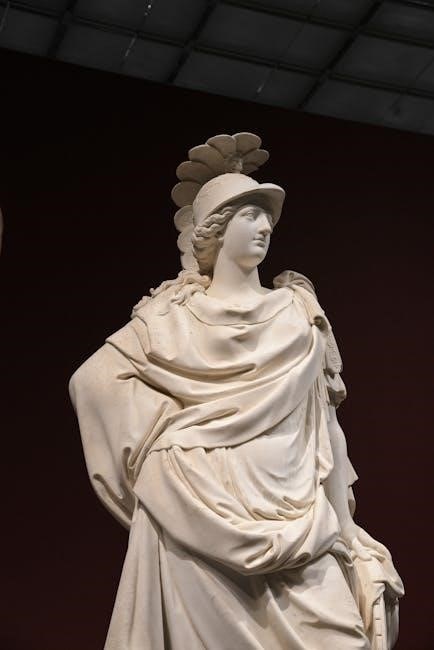classical myth barry powell 9th edition pdf
Classical mythology explores the rich, timeless stories of ancient Greek and Roman cultures, offering insights into their beliefs, values, and understanding of the world. These myths, often featuring gods, heroes, and legendary creatures, explain natural phenomena, human nature, and cultural traditions. They have profoundly influenced art, literature, and philosophy, making them a cornerstone of Western cultural heritage. Barry B. Powell’s Classical Myth (9th Edition) provides a comprehensive guide to these narratives, helping students engage with their significance and relevance.
1.1 Definition and Scope of Classical Mythology
Classical mythology refers to the collection of myths, legends, and stories from ancient Greek and Roman civilizations. These narratives explain the origins of the world, natural phenomena, and human experiences through divine and heroic figures. The scope of classical mythology encompasses a wide range of themes, including the lives of gods, heroes, and mythical creatures, as well as the cultural, religious, and moral values of ancient societies. Barry B. Powell’s Classical Myth (9th Edition) provides a comprehensive exploration of these stories, offering insights into their historical context and enduring influence on Western culture.
1.2 Historical Context of Classical Mythology
Classical mythology originated in ancient Greece and Rome, serving as a framework to explain natural phenomena, human experiences, and cultural values. These myths, often rooted in religious beliefs, were passed down through oral traditions before being recorded in literary works like Homer’s epics and Vergil’s Aeneid. The historical context spans from the 8th century BCE to the Roman Imperial period, reflecting societal changes and the evolution of religious thought. Barry B. Powell’s Classical Myth (9th Edition) provides a detailed analysis of these narratives, highlighting their historical development and enduring influence on Western culture.
1.3 Importance of Studying Classical Mythology
Studying classical mythology offers profound insights into the cultural, philosophical, and artistic foundations of Western civilization. It reveals how ancient societies understood the world, humanity, and the divine, shaping their values and traditions. Through myths, students gain a deeper appreciation of literature, art, and history, as well as universal themes that remain relevant today. Barry B. Powell’s Classical Myth (9th Edition) emphasizes the enduring significance of these stories, providing a rich resource for understanding their lasting impact on modern thought and culture.

Overview of Barry B. Powell’s Classical Myth 9th Edition
Barry B. Powell’s Classical Myth (9th Edition) is a comprehensive guide to Greek and Roman mythology, published by Oxford University Press, featuring enhanced digital resources and scholarly insights.
2.1 Author Background: Barry B. Powell
Barry B. Powell is a renowned scholar and author specializing in classical mythology and ancient languages. With a distinguished academic career, he has taught at several universities and contributed significantly to the field. Powell’s work emphasizes the cultural and historical context of myths, making them accessible to modern readers. His extensive research and engaging writing style have made Classical Myth a leading textbook. Powell’s dedication to education and scholarship has earned him recognition, ensuring his texts remain essential for students and enthusiasts alike.
2.2 Key Features of the 9th Edition
The 9th edition of Classical Myth by Barry B. Powell offers enhanced digital resources, including an eTextbook with interactive features and online supplements. It provides comprehensive coverage of Greek and Roman myths, with updated translations and interpretations. The book includes over 700 pages of scholarly content, featuring illustrations, cultural context commentary, and a robust index. New to this edition are expanded study materials and multimedia resources, ensuring a deeper understanding of classical mythology. Its accessibility in various formats, including PDF, makes it a versatile tool for both students and educators.
2.3 Structure and Organization of the Book
Classical Myth by Barry B. Powell is structured to provide a seamless exploration of classical mythology. The book begins with an introduction to the subject, followed by chapters that delve into Greek and Roman myths, cultural contexts, and interpretative analyses. Each section is supported by digital resources, including illustrations and study aids, enhancing comprehension. The appendices and references are meticulously organized, offering further insights and scholarly support. This clear and logical organization makes the 9th edition an invaluable resource for both students and educators.
Themes and Topics Covered in the Book
Classical Myth by Barry B. Powell is meticulously organized to enhance learning. The book begins with foundational concepts, progresses through detailed narratives of Greek and Roman myths, and includes interpretative analyses. Digital resources, such as illustrations and study aids, complement each chapter, while appendices and references provide additional scholarly support. This logical structure ensures accessibility for students and educators, making the 9th edition a comprehensive and engaging resource for understanding classical mythology.
3.1 Greek and Roman Mythology: Similarities and Differences
Greek and Roman mythologies share common themes, such as the existence of gods, heroes, and supernatural events, but they also exhibit distinct differences. Both traditions feature pantheons of gods with human-like qualities, but Roman mythology often aligns its deities with Greek counterparts, such as Jupiter with Zeus. Greek myths tend to focus on human drama and moral lessons, while Roman myths emphasize civic duty and national identity. Despite these differences, both cultures used mythology to explain natural phenomena, human behavior, and societal values, leaving a lasting impact on Western culture and literature.
3.2 Major Myths and Their Interpretations
Major myths in classical mythology, such as Persephone’s abduction, Orpheus’s descent, and Hercules’s twelve labors, are explored in Barry B. Powell’s Classical Myth (9th Edition). These stories are interpreted as reflections of human struggles, moral dilemmas, and cultural values. Powell examines how myths explain natural phenomena and the human condition, offering insights into their psychological and symbolic meanings. By analyzing these narratives, readers gain a deeper understanding of ancient societies’ beliefs and the enduring relevance of mythology in modern times.
3.3 Cultural and Historical Context of Myths
Myths in classical mythology are deeply rooted in the cultural and historical contexts of ancient Greek and Roman societies. They reflect the values, beliefs, and traditions of these civilizations, often explaining natural phenomena and the origins of customs. Barry B. Powell’s Classical Myth (9th Edition) highlights how myths were shaped by historical events and societal norms. By analyzing these stories within their cultural framework, readers gain insights into the religious practices, moral codes, and identity of ancient peoples, revealing how myths served as a mirror to their world and continues to influence modern understanding.
The Evolution of Classical Mythology
Classical mythology evolved over centuries, adapting to cultural shifts and historical changes, transforming oral traditions into written records that shaped ancient civilizations’ identities and beliefs.
4.1 Early Sources of Classical Mythology
Early sources of classical mythology include ancient Greek texts like Homer’s Iliad and Odyssey, Hesiod’s Theogony, and works by Greek tragedians such as Aeschylus, Sophocles, and Euripides. These works preserved myths that explained the origins of the world, gods, and humanity. Roman authors like Ovid later adapted these myths in works such as Metamorphoses, blending Greek and Roman traditions. These sources, passed down through generations, form the foundation of classical mythology studies, as highlighted in Barry B. Powell’s Classical Myth (9th Edition).
4.2 Development of Mythological Themes Over Time
Classical mythological themes evolved over centuries, adapting to cultural, political, and social changes in ancient societies. Early myths focused on cosmogony and divine genealogies, while later narratives emphasized heroism, morality, and human dilemmas. Roman mythology incorporated Greek stories but aligned them with Roman values and history. This evolution reflects the dynamic nature of myths as they were retold and interpreted across generations, ensuring their relevance in shifting contexts. Barry B. Powell’s Classical Myth (9th Edition) explores this transformative process, offering insights into how myths maintained their significance over time.
4.3 Influence of Classical Mythology on Later Cultures
Classical mythology has profoundly shaped Western culture, influencing literature, art, and even scientific thought. Themes like heroism, morality, and the human condition continue to resonate in modern works, from Shakespearean dramas to contemporary films. The names of constellations and psychological concepts, such as the Oedipus complex, highlight mythology’s enduring legacy. Additionally, the Renaissance revived interest in classical myths, inspiring masterpieces in art and literature. Barry B. Powell’s Classical Myth (9th Edition) underscores how these ancient stories remain relevant, adapting to new cultural contexts while preserving their timeless appeal.
The Role of Classical Mythology in Education
Classical mythology is a cornerstone of humanities education, fostering critical thinking, cultural literacy, and interdisciplinary connections. Barry B. Powell’s Classical Myth (9th Edition) provides a comprehensive resource for students, enabling them to explore ancient narratives’ relevance in understanding history, literature, and art. The book’s structured approach, combined with digital supplements, enhances learning experiences, making it an essential tool for educators and students alike in academia.
5.1 Use of Classical Mythology in Academic Curricula
Classical mythology is integral to academic curricula, offering insights into ancient cultures and their influence on modern societies. Barry B. Powell’s Classical Myth (9th Edition) is widely adopted in university courses, such as those at the University of Texas and California State University, for its comprehensive coverage of Greek and Roman myths. The text’s structured approach, combined with digital supplements, enhances students’ understanding of cultural and historical contexts, making it a vital resource for interdisciplinary studies in humanities, literature, and history.
5.2 Teaching Methods and Resources
Instructors use diverse methods to teach classical mythology, incorporating discussions, multimedia, and virtual tours to engage students. Barry B. Powell’s Classical Myth (9th Edition) supports these approaches with digital resources like the eTextbook, online supplements, and study materials. The instructor’s manual and test bank provide structured lesson plans, while interactive features enhance student participation. These tools cater to various learning styles, fostering a deeper understanding of myths and their cultural contexts. The combination of traditional and digital resources ensures a dynamic and inclusive learning experience for students and educators alike.
5.3 Impact on Students’ Understanding of Ancient Cultures
Studying classical mythology through Barry B. Powell’s Classical Myth (9th Edition) profoundly enhances students’ understanding of ancient Greek and Roman cultures. The book’s comprehensive narratives and analyses reveal the societal values, religious beliefs, and historical contexts that shaped these civilizations. By exploring myths, students gain insights into the cultural, ethical, and artistic traditions of antiquity, fostering empathy and appreciation for ancient perspectives. This understanding not only illuminates the past but also highlights the enduring influence of classical mythology on modern Western culture and identity. The text bridges the gap between ancient and contemporary worlds, enriching students’ cultural literacy and critical thinking skills.
Digital Resources and Supplements
The 9th edition of Classical Myth offers digital resources, including an eTextbook, online supplements, and study materials, enhancing learning with interactive tools and accessible formats.
6.1 eTextbook and Digital Edition Features
The 9th edition of Classical Myth by Barry B. Powell is available as an eTextbook and digital edition, offering enhanced features for modern learners. Published by Oxford University Press, the digital version includes ISBNs 9780197527993 and 019752799X, ensuring easy access via platforms like VitalSource. The eTextbook features searchable text, interactive navigation, and multimedia elements such as maps and images. Additionally, the PDF version provides a clean, readable format compatible with various devices. These digital features make the text more engaging and accessible for students studying classical mythology.
6.2 Online Supplements and Study Materials
Oxford University Press provides extensive online supplements for Classical Myth (9th Edition), enhancing student engagement and understanding. These resources include interactive maps, timelines, and quizzes to reinforce key concepts. Instructor resources, such as lecture slides and test banks, are also available to support teaching. Additionally, the digital platform offers flashcards, study guides, and multimedia content to aid independent learning. These supplements ensure a comprehensive and interactive learning experience, making classical mythology accessible and engaging for modern students and educators alike.
6.4 Accessing the PDF Version
The PDF version of Classical Myth (9th Edition) by Barry B. Powell can be accessed through various platforms, including Oxford University Press and digital bookstores like VitalSource. Users can purchase or rent the eTextbook, with ISBNs 9780197527993 and 019752799X for digital versions. Additionally, websites like Ebookshopsolution.com and Libgen.li offer download options. Ensure authenticity by purchasing from reputable sources. The PDF format allows for easy access on devices, making it convenient for study and reference. This digital version is cost-effective and includes all the book’s content, supporting both student and educator needs effectively.
Reviews and Reception
Classical Myth’s 9th Edition is highly praised for its comprehensive approach, earning scholarly acclaim and popularity among students and educators alike, enhancing understanding of ancient myths.
7.1 Scholarly Reviews and Feedback
Scholarly reviews highlight Barry B. Powell’s Classical Myth 9th Edition as a definitive resource, praised for its meticulous research, engaging narrative, and inclusion of primary sources; Academics commend its ability to balance depth with accessibility, making it invaluable for both undergraduate studies and advanced research. The integration of digital resources and updated commentaries enhances its educational value, solidifying its reputation as a leading textbook in classical mythology.
7.2 Student Feedback and Popularity
Students and educators praise Barry B. Powell’s Classical Myth 9th Edition for its engaging narrative and comprehensive coverage. Its popularity stems from its clear, lively storytelling, making complex myths accessible. Enhanced digital resources, including eTextbook features and study aids, boost its appeal. The text’s ability to connect myths to cultural and historical contexts is particularly valued. Visual elements and supplementary materials further enrich the learning experience, solidifying its status as a favored resource in classical mythology courses.
7.3 Comparisons with Previous Editions
The 9th edition of Barry B. Powell’s Classical Myth surpasses previous versions with updated content, enhanced digital features, and improved organization. New interpretations of myths and expanded cultural context discussions provide deeper insights; The inclusion of more visual aids and supplementary materials enhances accessibility for students and educators. These enhancements maintain the book’s reputation as a leading resource in classical mythology studies while addressing evolving educational needs.

The Significance of the 9th Edition
The 9th edition of Barry B. Powell’s Classical Myth is a comprehensive scholarly text, enhanced with digital resources, new illustrations, and expanded commentary, making it indispensable for modern students.
8.1 Updates and Revisions in the 9th Edition
The 9th edition of Classical Myth by Barry B. Powell features comprehensive updates, including enhanced digital resources, new illustrations, and expanded commentary on cultural contexts. The revised content ensures clarity and depth, with updated translations and interpretations of myths. Additional materials, such as online supplements, provide interactive learning tools, making the text more accessible and engaging for modern students. These revisions reflect the latest scholarly insights, offering a fresh perspective on classical mythology while maintaining the book’s traditional academic rigor and accessibility.
8.2 Enhanced Features for Better Understanding
The 9th edition of Classical Myth includes enhanced features designed to improve student comprehension and engagement. These features encompass detailed maps, vibrant illustrations, and in-depth analyses of mythological themes. Digital tools, such as interactive timelines and multimedia resources, provide a dynamic learning experience. Additionally, the text incorporates primary sources and scholarly interpretations, offering a well-rounded exploration of classical mythology. These enhancements cater to diverse learning styles, ensuring that students can grasp the complexities of ancient myths in a contemporary educational setting.
8.3 Contribution to the Field of Classical Mythology
Barry B. Powell’s Classical Myth (9th Edition) has significantly advanced the field of classical mythology by providing a comprehensive and accessible exploration of ancient myths. Its inclusion of diverse sources, scholarly insights, and modern interpretations has set a new standard for academic texts. The book’s enhanced digital features and updated scholarship ensure its relevance in contemporary education. By bridging traditional narratives with innovative learning tools, it continues to inspire new generations of students and scholars, solidifying its role as a foundational resource in the study of classical mythology.

The Publisher’s Role
Oxford University Press has played a pivotal role in publishing and distributing Classical Myth, ensuring its accessibility and enhancing its educational impact with digital resources, further solidifying its reputation as a leader in academic publishing.
9.1 Oxford University Press and Its Reputation
Oxford University Press, renowned for its academic excellence, has published Classical Myth by Barry B. Powell, underscoring its commitment to scholarly rigor and accessibility. As a leading global publisher, OUP ensures high-quality content, making it a trusted source for educational materials. The ninth edition of Classical Myth benefits from OUP’s reputation, providing students and scholars with a reliable and comprehensive resource. Its dedication to preserving and advancing knowledge has solidified OUP’s position as a cornerstone of academic publishing worldwide.
9.2 Publishing History of Classical Myth
Classical Myth by Barry B. Powell has a rich publishing history, with its ninth edition released in 2020 by Oxford University Press. Earlier editions were published by Pearson, with the first edition appearing in 2012. The book has evolved over the years, incorporating new scholarship and digital resources. Its enduring popularity stems from its accessible and comprehensive approach to Greek and Roman mythology. Oxford University Press’s involvement has further enhanced its academic credibility, ensuring it remains a leading resource in the field of classical studies.
9.3 Marketing and Distribution Strategies
Oxford University Press employs robust marketing and distribution strategies for Classical Myth, ensuring its widespread availability. The book is sold in paperback, eTextbook, and PDF formats, with discounts offered for digital versions. It is distributed through major online retailers, academic platforms, and university bookstores. The Press leverages its reputation and global network to promote the text, targeting students and educators. Additionally, the inclusion of digital learning resources enhances its appeal, making it accessible to a diverse audience while maintaining its academic integrity and market presence.

Accessibility and Resources
The 9th edition of Classical Myth is available in paperback, eTextbook, and PDF formats, ensuring accessibility for various learning preferences. Oxford University Press provides online supplements, study materials, and instructor resources, enhancing engagement and understanding for both students and educators. Digital platforms like VitalSource offer discounted eTextbooks, making the content widely accessible. Additional resources, including translations and commentary, further support learners in exploring classical mythology.
10.1 Availability of the Book in Various Formats
Classical Myth by Barry B. Powell is available in multiple formats, including paperback, eTextbook, and PDF. The paperback edition offers a traditional reading experience, while the eTextbook and PDF versions provide digital accessibility. ISBNs for the print edition are 9780197527986 and 0197527981, while digital ISBNs include 9780197527993 and 019752799X. The book can be purchased or rented from over 30 bookstores and platforms like VitalSource, ensuring flexibility for students and educators. This range of formats caters to diverse learning preferences and accessibility needs.
10.2 Resources for Students and Educators
Oxford University Press provides extensive resources for Classical Myth by Barry B. Powell, enhancing both teaching and learning. Instructor resources include lecture slides, discussion prompts, and test banks, while students benefit from online supplements like study guides and interactive quizzes. The 9th edition features digital learning tools, such as translations, commentary, and cultural context illustrations, accessible via the eTextbook and PDF versions. These resources support a deeper understanding of classical mythology and facilitate engaging classroom discussions, making the book a valuable tool for academic success.
10.3 Support for Different Learning Styles
The 9th edition of Classical Myth by Barry B. Powell offers resources tailored to diverse learning styles. Visual learners benefit from illustrations and plates depicting mythological scenes, while auditory learners can engage with audio narratives of key myths. Kinesthetic learners can interact with online quizzes and exercises that reinforce comprehension. The eTextbook and PDF versions provide flexible access, allowing students to study at their own pace. These features ensure that all learners can effectively explore classical mythology, regardless of their preferred learning approach, fostering a comprehensive understanding of the subject.

The Future of Classical Mythology Studies
The future of classical mythology studies lies in digital integration, interdisciplinary approaches, and global perspectives, enhancing accessibility and relevance in modern scholarship and education.
11.1 Emerging Trends in Mythological Research
Emerging trends in mythological research include the integration of digital tools, such as eTextbooks and multimedia resources, to enhance accessibility and engagement. Barry B. Powell’s Classical Myth (9th Edition) exemplifies this trend, offering a comprehensive digital platform with illustrations and commentary. Additionally, interdisciplinary approaches are gaining traction, blending mythology with cultural studies, psychology, and history. Scholars are also exploring global mythological traditions, fostering a more inclusive understanding. These innovations ensure that classical mythology remains relevant in modern academic and cultural discourse, appealing to a diverse audience of students and researchers alike.
11.2 Technological Advancements in Education
Technological advancements are transforming education, with digital textbooks and online resources like Barry B. Powell’s Classical Myth (9th Edition) leading the way. eTextbooks offer interactive features, multimedia enhancements, and accessible formats, enabling students to engage with classical mythology in innovative ways. Platforms like VitalSource provide cost-effective digital access, while online supplements, such as illustrations and commentary, enrich the learning experience. These tools cater to diverse learning styles, fostering deeper understanding and retention. Technology is making classical mythology more accessible and engaging for modern students, ensuring its relevance in today’s educational landscape.
11.3 The Role of Classical Mythology in Modern Society
Classical mythology continues to influence modern society through literature, art, film, and psychology. Themes like heroism, morality, and human nature remain universal, resonating across cultures. Myths inspire contemporary storytelling, from movies to literature, while psychological concepts like the “Oedipus complex” highlight their enduring relevance. Education resources, such as Barry B. Powell’s Classical Myth (9th Edition), ensure these stories remain accessible, fostering appreciation for their cultural and historical significance; By studying classical mythology, society gains insights into its shared heritage and the foundations of Western civilization.
12.1 Summary of Key Points
Classical Myth by Barry B. Powell is a seminal work that delves into the intricate world of Greek and Roman mythology, offering a rich tapestry of stories, interpretations, and cultural insights; The 9th edition, published by Oxford University Press, is renowned for its comprehensive coverage, enhanced digital resources, and scholarly approach. Powell’s expertise shines in his ability to connect ancient myths to modern understanding, making the text invaluable for both students and educators. The book’s structured format, combined with its accessible language, ensures a deep engagement with the subject matter, solidifying its place as a cornerstone of classical mythology studies.
12.2 Final Thoughts on the Importance of Classical Mythology
Classical mythology remains a vital cornerstone of cultural and intellectual heritage, offering timeless lessons about human nature, ethics, and society. Barry B. Powell’s Classical Myth underscores its relevance, bridging ancient narratives with modern understanding. The 9th edition’s digital enhancements and scholarly insights ensure continued accessibility and engagement. By studying these myths, readers gain not only historical knowledge but also a deeper appreciation for the enduring themes that shape human experiences, reinforcing the importance of classical mythology in education and beyond.
12.3 Encouragement for Further Study
Exploring classical mythology offers a rewarding journey into the heart of ancient cultures, revealing timeless themes and universal truths. Barry B. Powell’s Classical Myth (9th Edition) serves as an excellent resource for deeper exploration, combining scholarly rigor with accessible narratives. Readers are encouraged to delve into primary sources, such as Greek and Roman texts, and engage with digital supplements for a richer understanding. By embracing this field, students and enthusiasts alike can gain a profound appreciation for how mythology shapes our understanding of the world and inspires ongoing intellectual and creative inquiry.











Leave a Comment